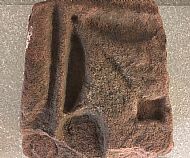LETTERS HOME
The weather? I can’t tell them about the damned weather, they don’t want to know about the rain turning the earth to foul, putrid mud. We call it mud, the officers call it mud, but as the trenches fill and the duckboards sink, you know it’s so much more. Rats, they’re the best of it, dead, rotting…eventually the smell doesn’t bother you anymore, strike up another smoke and carry on. Sometimes it’s your mates, the pals you joined up with; Fritz gets lucky and they hit our trench. Occasionally a silly bugger will stick his head above the parapet, like young Billy did. So much blood. And if you get caught short—well, you can’t go running all the way back to the billet, can you. Most of us get caught short before we go over the top.
Dearest Mama and Papa, thank you so much for the parcel you sent last week; the biscuits arrived with only a few smashed to smithereens. I shared them with the chaps I bunk with, all of us thought they were jolly good. Thank you also for the mitts and socks which came by a separate post; you must have been very busy with your needles, Mama, the wool is beautifully soft and just to think of your dear hands upon it and your familiar scent still lingering….
Lingering. But not for long. I did my best, I scrubbed my feet before I put the socks on, but there was only cold water and my boots still leak.
I think of you all every day, of life in our little village going on while I am so far away. I miss going to out to sea with you in the Rosa-Belle, Papa; I hope the winds and tides are being kind to you and your catches are good. I pray this long war will soon be over. Until then, I remain, your loving son, Samuel.
*
Dawn came late in autumn; he stood among the ranks of men filling the trenches, all of them waiting as the youthful officer passed up and down the assembled lines, urging them to preparedness as they waited for the signal to charge.
Guns pounding enemy lines set the very earth trembling, masking the chattering teeth and shaking hands of old soldiers and new recruits alike. Yet still they waited, tense energy held in check.
A sliver of grey light crept over the horizon. A whistle blew.
“Charge!” “Forward!” “Go!” “Yahhh!” Indiscriminate battle cries terrifying the enemy, encouraging their own onward progress over the top, over the sodden, uneven ground strewn with the remnants of already fruitless battles fought for a few barren yards of disputed earth.
A man fell in front of him, then another, torn to shreds by deadly fire from the enemy hidden in trenches a few hundred yards ahead of them. He wiped blood from his eyes and carried on.
Shells burst in front of him, more men fell. Gunfire raked across their lines, still more men fell. Someone kicked him in the belly, hard, but he took a step, then another, still going forward.
Men passed him, running, buffing against him, burling him round and round until he was dizzy and the breath knocked out of him. A new sensation grew; blossoming from his guts until it burst in a wave of heat and agony, engulfing his whole body.
The world slowly spun as he floated to the ground.
He would rest in the mud a while, the mud was cold like the sea. He could smell the sea, taste salt water on his lips, feel the spume dampening his face as the Rosa-Belle crested the waves.
*
“Burial detail to me!” The sergeant’s order echoed up the line and a dozen or more men shuffled forward. “We’ve gained control of No-Man’s Land from La Ville to the crossroads. Let’s get out there, do what we can. Corporal, find some volunteers for the carts and make a start transporting the remains, complete and identifiable first if you please. The rest of you, collect shovels from supplies and muster at Artios’ Field at oh eight hundred hours. The chaplain will meet us there.”
At least the rain meant easy digging; shallow holes in the mud, hardly graves, quickly dug and rapidly filled as the priest muttered a brief prayer and the corporal noted names and numbers in his ledger.
Campbell, A. 235119; Innes, S. 886211; MacIntosh, W. 445768.
On and on, the lines of plain wooden crosses marking the graves grew and stretched across the new burial ground, the list of names filled column after column in the ledger until there were no more names to be recorded, and in the field, only a pit dug and filled with—.
*
Gulls caught the breeze, swooping and diving above the fishing boats ploughing through the choppy waves as they made their way to the small harbour.
Mrs Innes watched the boats as she pegged her washing to the line strung across the yard, squinting her eyes, trying to make out the Rosa-Belle. The sky was grey, leaden, it would probably rain later but the wind whipping in from the sea might dry Mr Innes’ shirts first.
She wiped her hands on her apron and crossed the lane to the small jetty to get a better view. She never tired of gazing at the waves, calmly confined within the harbour wall, splashing excitedly beyond it. The tang of salt filled the air, she thought she could even smell the fish on the boats approaching home after sailing early to catch the tide.
A movement caught her eye.
A figure entered the yard, a figure in a post office uniform. Only two doors were at this end of the row of cottages, hers and Mrs Mackay who was old and over seventy and had no sons—oh God!
Wordless keening filled the air.
*
Dear Mr and Mrs Innes
I am writing to express my deep sympathy with you in the great loss of your son, Samuel. Had our casualties been fewer on the sad day of his death I would have written all the sooner. Your son was in the forward lines, bravely attacking the German positions when he was hit by enemy fire. His suffering was brief as he passed into our Lord’s care almost immediately. His comrades buried him close to where he fell, and I conducted the funeral service myself, commending his soul to Our Heavenly Father. A simple cross marks his grave which will be registered with the appropriate department within the War Office in London. Had he survived, I am sure he would have made a name for himself. Even now, in these days of quickly forgotten friendships, his company remember him with deep regret. You may be proud that it was in the front line and calmly facing the foe that your boy was called home and I hope you find comfort knowing that he gave his life in the greatest sacrifice a man can make, fighting for the sacred cause of Right and Justice.
Signed, James Kelly, Chaplain.
THE END
Jane Patten
March 2018





